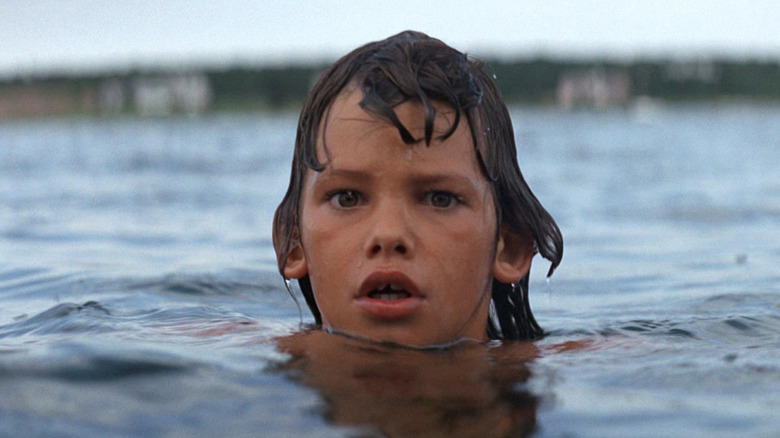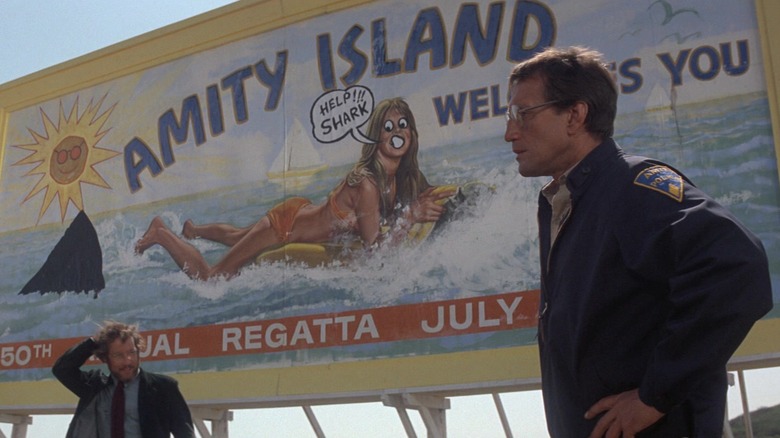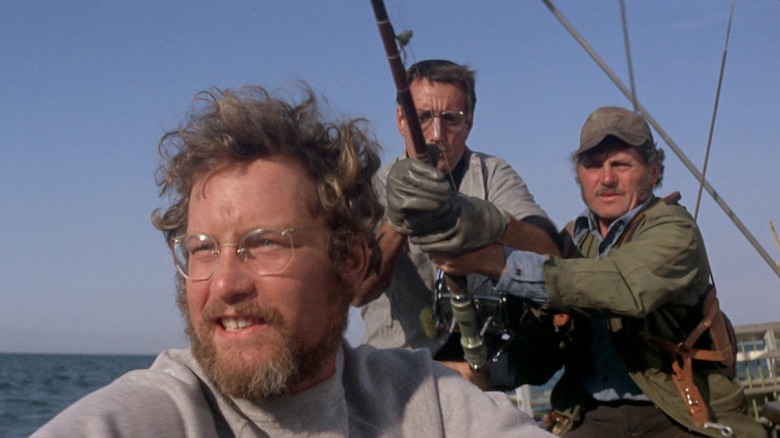It's 2025 And I Just Watched Jaws For The First Time – These Are My Honest Thoughts
Steven Spielberg's "Jaws" is a seminal work of cinema that changed the way audiences watched movies, teaching them to examine themes and metaphor beneath a seemingly simple story. Critics regularly rank it among the best movies of all time and its impact on blockbuster cinema cannot be understated ... but despite all of that, at age 38, I still hadn't seen it. A phobia of sharks and an aversion to some of Spielberg's family-friendly fare kept it off my watchlist for years, but after a whole lot of desensitization via shark documentaries, I decided to change that, and just in time for the film's 50th anniversary.
Despite having never seen "Jaws," I felt like I had absorbed everything I really needed to know about it from other media. After all, the film has been referenced and homaged in just about everything from "Star Trek" to "It's Always Sunny in Philadelphia." Even so, there are elements that all of these secondary interpretations don't capture. "Jaws" is fascinating because it's a rare cinematic achievement that stands the test of time — even if some of its special effects don't. It's so much more than just a killer shark movie or a crowd-pleasing popcorn blockbuster, because despite being both very well, it's a multifaceted critique of American politics that feels all too relevant five decades later.
Jaws is even funnier and sharper than I expected
While I knew there were some jokes in "Jaws," like the oft-imitated "You're gonna need a bigger boat," I had no idea just how funny the movie could be. "Jaws" drops us right into Amity Island on the Fourth of July weekend, where police chief Martin Brody (Roy Scheider) is trying to keep people safe despite the fact that there's apparently a human-snacking shark lurking around the beaches. The film's pacing is immaculate, delivering tons of information with minimal exposition, and it uses a fantastic rotation of suspense building, scares and tension-relieving comedy to keep you engaged. The legendary score by composer John Williams helps keep things moving, too; combined with expert editing by Verna Fields, it helps sell the tension to the point where, despite knowing when the jump-scares were coming, I still jumped and yelped in fright. (The score arguably gets a little too bright and jaunty in the third act, leading to some tonal imbalances, but it's a tiny complaint about an otherwise incredible piece of music.)
"Jaws" is ostensibly about three men who try to stop a killer shark, but beyond that, it's also about how those in power will often put their needs and "economic concerns" above public safety, ignoring scientists and other experts in the pursuit of the almighty dollar. The bullish Mayor Larry Vaughn (Murray Hamilton) keeps Amity's beaches open despite knowing it could easily end in bloodshed, and it makes for an apt metaphor for everything from the U.S. government's handling of the COVID-19 pandemic to global warming when interpreted from the vantage of the present-day. The shark is just living according to its nature, but the humans who don't protect one another from its hunger are the real monsters. I'll admit: I didn't expect such layered commentary from "Jaws," but it's pretty pointed and shockingly smart.
Jaws is truly cinema at its finest
My own personal minor gripes with what we might now describe as the film's "adventurous Amblin" vibe aside (obviously, Spielberg made this movie before "Amblin-style" filmmaking was even a thing), "Jaws" is cinema at its finest. Spielberg wears his influences on his sleeve, with overt nods to greats like Alfred Hitchcock that help make the film feel truly cinematic. The cinematography is also phenomenal, with clear intention behind every single frame — something we sadly just don't see in most modern blockbusters. And despite its notoriously troubled shoot, "Jaws" is expertly crafted in every way.
Still, the thing that surprised me most was how much I cared for the three leads. Scientific shark expert Matt Hooper (a young, kinda hot Richard Dreyfuss) and local shark hunter Quint (Robert Shaw) help Brody hunt the shark, and the three men couldn't be more different, but they're also allowed to be really honest and vulnerable. The actors behind the trio are truly perfect, and each of their characters has since become an archetype; I really wasn't prepared for how many times I would realize that characters from other movies and TV shows had clearly been inspired by one of these men.
Overall, the camaraderie that builds between Hooper, Quint, and Brody despite their huge differences is pretty great, and it lends all the more weight to their survival (or death). The scares in "Jaws" are equally strong, while the laughs were, again, a lovely surprise. But ultimately, my biggest takeaway is that Hooper, Quint, and Brody are phenomenally written and performed characters who make the rest of the film matter.


